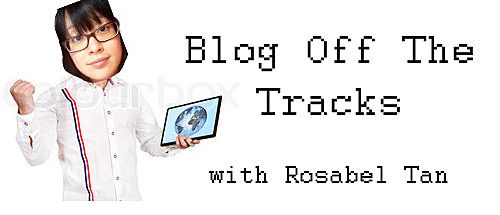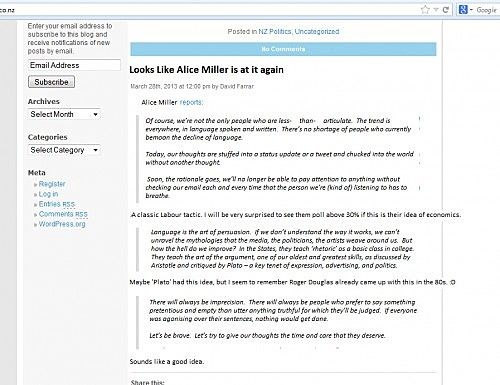Internet Histories: Easter Edition
April Fool's special: Changes at the Pantograph Punch, WhaleOil, and the Science of Selling out. Featuring new guest post by Michael Laws!
This Fortnight:
Changes at the Pantograph Punch
The Best Cooking and Gardening Personalities
That New York Restaurant Scene 'expose' | Musings on WhaleOil | Lists Lists Lists
The Centre Cannot Hold | The Science of Selling Out
And a warm welcome to our special guest writer
Michael Laws
Getting into the Groove: Changes at the Pantograph Punch
We’ve had a fantastic year at The Pantograph Punch. Since relaunching the site last May, we’ve worked with a rotation of talented writers, published some great essays and hosted a hugely successful public event. But as we grow, so too do we need to change. To evolve.
It is our pleasure to announce that from Monday 15 April, we’ll be joining the wonderful team over at Groove Guide, New Zealand’s leading weekly (and free!) music and entertainment publication.
What does this merger mean for you? Only good things. Not only will we be retaining the site in a very similar form, we’ll be publishing more pieces than ever before. We’ll also be bringing new writers on board to help us cast a fun and funky eye over local arts and culture.
Unfortunately, we will be going behind a paywall, but all proceeds will – very excitingly – be used to meet printing costs. That’s right. From next month on, you’ll also be able to find our writers in the pages of the Guide!
For fans of our Internet Histories feature, you’ll be able to read these in print now, too: I’ll be writing a weekly round-up called Blog Off The Tracks, complete with QR codes to take you back online. Joe Nunweek will be hosting Ask Your Bro Joe, where he’ll field whimsical questions about music and dating etiquette, and Uther Dean will be our lists man - have a crazy top five you’d like to see in print? Get in touch!
Everything that appears in the magazine will be freely available online, but you’ll need a subscription to access the rest of our content. Don’t worry – it’s a reasonable $24 a year, with the option of paying $3 a month. We would love your continued support, and to give you a taste of things to come, today we've got a guest post by none other than media darling Michael Laws. Coming up next week: Duncan Garner and Guyon Espiner In Conversation, giving each other the fourth degree on “What is current affairs, and why are we so good at it?”
Finally, I’d like to take this opportunity to thank Matt Harnett, who developed the idea for Internet Histories and who has up till now taken a lead role in facilitating their publication. Today’s edition marks the last as it exists in its current form, and I’m sure it’ll be a great one.
Happy reading,
Rosabel and the team at The Pantograph Punch
The popularity of cooking and gardening shows has always evaded me, partially because the personalities involved have never quite appealed. They're too smug. They're too earnest, or they have terrible taste. That's why John Stansfield (husband of Green MP Denise Roche) is the perfect host for a gardening series: He's warm, he's a good gardener and he tells the most awful (wonderful) dad jokes (e.g. "the reason we're knocking holes in the bottom [of this bucket] here is because plants don't like a wet root." Cut to: him strolling away, whistling nonchalantly).
http://pantograph-punch.com/wp-includes/js/tinymce/themes/advanced/img/trans.gif
As for cooking shows, the only one worth watching is David Lynch cooking quinoa for one. Unfortunately, the full twenty minutes have been taken down but you can watch the beginning here:
http://pantograph-punch.com/wp-includes/js/tinymce/themes/advanced/img/trans.gif
There's about eight minutes missing, during which time he pours himself a glass of wine and goes outside to light a cigarette. Sitting in the shadows, he recounts a dusty moonless train-ride he once took through Eastern Europe. He was with his friend, and the train was going to Venice. He remembers how they stop during the night. Right in the middle of the desert. From the train window, you could see a small tent. The tent was selling small bottles of sugar water. That’s where part two kicks in:
http://pantograph-punch.com/wp-includes/js/tinymce/themes/advanced/img/trans.gif
He imbues his story so masterfully with an air of supernatural mystery, and what's most striking is the confidence which which he speaks. He's not afraid to repeat himself for emphasis, and he has this thumping rhythm that feels like a slow heartbeat.
Supernatural mystery has also been hitting Japan as a new photo craze. Of all the fads we've seen in the past decade, this one - blasting each other like you're a character in Dragonball Z - is by far my favourite. More here.
Jose
I was told about this a few weeks ago and my jaw is still on the floor. My thinking is still the same: Great. Another spark has been extinguished and swept behind the great fat cat wall of oppression. We really need to sit up and take notice, because soon the internet might become the superhighway of secret sauce sponsored by McDonald's and Carl's Jnr and Monsanto. Fight it, or to put it another way:
http://pantograph-punch.com/wp-includes/js/tinymce/themes/advanced/img/trans.gif
Adam
With too much money and an image tied to privilege, people lose sight of living and become obsessed with appearing to live. The high life messes people up - and someday those people will write something that shows just how deluded they've gotten, just how out-of-touch they've become with the people that helped them get on top.
At least, that's the only explanation I have for Table 13 or bust, GQ writer Michael Wolff's 'expose' of the New York restaurant scene. He starts his article with the kind of sentence that suggests a kinship with the everyman reader - "If I ever give up on New York, it will be because of restaurants." In his first paragraph, he laments the myriad rules that restaurant people are honour-bound to follow and vents about the insecurities that are part of the territory. Oh good, he's really going to stick it to those uptight restaurant scenesters, good on him, we think, having not experienced the kind of food-fuelled mania that Wolff's about to describe.
Then he goes off the rails. As people are wont to when they've lost sight of their audience. A sight you'll probably all become familiar with at some point in your life. Maybe soon. WHO KNOWS?
Wolff's open about being a seasoned player of the restaurant game. He talks with authority about the four-meal-a-day life and its origins in the explosion of the financial sector in the 1980s and the progressive gentrification of New York City ("As the poor are moved out, new restaurants move in," Wolff says with the empathy and appreciation of socioeconomic realities you would expect of someone who’s written a two-page whine about New York restaurants). He tosses off numbers with a cruel nonchalance - restaurant price points vary between £7- £10 and £28-34, up to £123 per person per meal (including appetiser, wine, dessert, tax and tip), up to £246 per day spent on meals, etc. etc. He details a tiff with a restaurateur that ended up with him 'cast...into a lunchtime wilderness' and acts like a minor martyr because of it – he did take a "principled stand", after all.
To emphasise - the man spends more than I earn in a year on restaurants.
But pride comes before the fall, and it’s increasingly evident that this isn't an overview by a man disgusted that he ever bought into the culinary version of Game of Thrones. This is the death-rattle of a man bloated with privilege, a man blind to his own absurdity. He regularly falls back to complaining about lost privileges at coveted restaurants. He talks about 'dropping' friends who take him to 'grim little Japanese places for lunch'. And, in the article's grandest example of Wolff’s grotesque, unvarnished self-absorption, he talks about the young and how much he hates and loves and hates them -
Only in the most expensive, ritualised and ceremonial establishments (we're talking thousands per table) is there any attention to physical comfort and the basic science of acoustics. This is not only because the people in these restaurants are very rich, but also because they are very old. One of the points about restaurants is to feel young, or to be among the young, or, that is, the right young - the young who can afford expensive restaurants, albeit not as expensive as the restaurants for the very old and rich. (Almost everybody on the Upper East Side, where, in New York, the expensive and quiet restaurants are located, now travels great distances to eat among the young and loud.
Right after this, he notes that he's running the risk of sounding cranky and losing all his restaurant privileges. But his sounding cranky isn't the problem. The problem is that he sounds sociopathic. He sounds like a man so insulated by his bubble of privilege that he doesn't give a damn about the lower income neighbourhoods forced out by gentrification, that he both loves and fears the under-30s hoi polloi encroaching on his sacred space, that he could not care less about the people who can't afford nearly three hundred pounds a day to eat a restaurants.
Table 13 or bust’s description of a restaurant culture defined by psychological warfare and monstrous self-regard is fascinating, but it could have so easily turned into a polemic in the hands of an outsider baffled and disgusted at the privilege on display. Wolff’s genuine disappointment at being muscled out of the scene is what makes it frightening, an intercepted communique from the other side of a culture war. To Wolff, all of this is totally normal. “Why would you be here if not for the restaurants?”
Before I leave you, here's a short but interesting NPR interview with Gordon Corera, security correspondent for the BBC, about depictions of MI6 in contemporary media and MI6's role in a post-9/11 world. He’s also written a book that’s apparently pretty good. It’s called The Art of Betrayal.
Michael Laws
AT WHAT POINT has the media become our moral conscience? The answer is: never.
Indeed it has been my experience that most individuals who work within the industry suffer the same morality quandaries as the rest of us. Very possibly, more. Because they are routinely required to lie, deceive and chisel to get their best stories pretending to be friends when they are not, pretending to care when they don't. The front page, or the breaking story, is always their mistress.
They have another, collective, mission and it is that motive that reduces any genuine hope of worthiness. For the media's prime intent is to make money. Indeed this is the great truth that most media prefer to fudge. They are in business: not to change the world, but to profit from it. Deal with it. The age of the noble crusading journalist, if it ever existed, is well and truly over.
As I constantly remind my children and any Facebook flirt, I am an old man.
I have reached that age – 54 – when I know there's no point in a Peter Pan pretence. I greet mates with talk of bowels rather than of hot chicks or deals we didn't score last night. I have been on this earth too long to be an idealist. I am a populist, and if you are opposed to popular opinion you are opposed to democracy. I am paid to be an opinion maker.
I am an accidental recruit to the Dark Side that is the New Zealand news media. But then New Zealand has a history of bad boys and mad girls making good in the media that combination of licentiousness and lunacy is so often entertaining, if not enlightening. I look forward to bringing a little of that entertainment to you here every day from today.
Bronwyn
So, I feel like we've all read "future of the media" articles until we can recite them in our sleep: traditional ad revenue is down, comments are the new black, specialist writers are being let go all over the shop to be replaced by people very good at rewriting press releases, if you're not across the second screen you're a lame duck yadda yadda yadda. I think that even the NZ Woman's Weekly has touched on it, which as every follower of fashion knows, is the kiss of death for any trend.
Well, apart from being the trend killer, the Woman's Weekly is also a barometer of what we're all too afraid to say, and if they say that media needs to change, media needs to change. For obvious reasons, I've been thinking about all of that over the last few days, and here's some of what I've been reading:
The Columbia Journalism Review provides a short overview: "There are an infinite number of points on the spectrum between tip jar and paywall...And in general, the more you’re asking for, the more coercive you need to be."
Gloomy pants columinist Bob Garfield claims that we are in the "end times", conveniently ignoring the fact that he is being paid to write for The Guardian, a newspaper not behind a paywall, and one that is lauded for both their content and their digital management strategy.
Finally, this article might come in useful for all of us soon.
Josh
It's been a while since I submitted an Internet History, but that's only because there's so much good stuff to read on Whale Oil Beef Hooked. You probably haven't heard of it, but it's nice to see that there is at least one blog out there that is covering the arts/cultural/political zeitgeist in a meaningful way without resorting to capitalist paywallmongery. It's a bit of a strangely-named blog - I have been puzzling over what the name might mean. Ultimately I think it's a commentary on the Japanese attitude to so-called scientific whaling. You see, the "whale" is "beef" to the whale-hungry Japanese. The "oil" in the name is the nickname of blog proprietor (and Truth editor) Cameron Slater, who looks like he shares a hairstylist with Tommy Wiseau.
Peculiar nonclementure aside, Whaleoil has some seriously good content. Today Mr Oil has a particularly strong scoop: a terrorist group called the Green Taliban is planning a blockade of Auckland Airport. This move comes in response to the government's plans to ban protests within 500 metres of mining stuctures and ships - 500 metres being the distance within any protest activity would cause psychic reverberations within mining machinery, causing it to fail. This law would prevent any further mining disasters in New Zealand, and the Green Taliban would protest against it! How ghastly. One of Mr Oil's commentators, operating under the nom de plume Hazards001, provides a succinct summary of the situation:
These bastards with their lies and propaganda have seriously effected my ability to get the full value of my knowledge and experience in NZ. We need to start extracting the full value of our wealth from the ground and these bullshitting pricks are the main force behind our lagging behind Aussie in all areas of economic growth!
Minarchist_kiwi too has some valuable input:
What a wonderful new policy by the National government; lock up all the greenies for being destructive bullies. Good thing too!
Then we have Phar Lap (I assume Mr Lap's real name has been obscured to protect him from the Green Taliban, although his typing skills do suggest he may in fact be a dead racehorse.)
Just pass a law to deport any wet backs in the joke green party ,if they step out of line ,or try to teach us their ways,destroying signs, or using taxpayers money for referendums,not forgetting bogus rent trusts,using taxpayers money.Norman ,and Genter should be given three strikes, then they are deported back to their fucked up nations,we dont need them to further fuck up NZ,like they have done up to now by sneaking into NZ under the radar.
Stirring stuff. The other comments all contain wisdom in a similar vein; I strongly encourage all Punch readers to visit Oil's blog for much more of the same.
*
There's nothing more hip right now than examining the limitations of traditional masculine paradigms, and as usual, Whale Oil is right on the money.
There's not a lot of words in this blog post, intriguingly titled Chippie and Duck Get Their Beans but Mr Oil places them with the exquisite tenderness of a good Kiwi bloke putting on a gumboot that might have a weta in it. "John Key rarked up the opposition and slammed Robertson’s question. Trevor Mallard and Chris Hipkins had a cry – then got rightly booted out," Mr Oil says.
He's right, too. It's about time we confronted traditional attitudes about public displays of male emotion, and who better to be the front-man for this discussion than our virile Prime Minister, Mr John Key?
*
"Internet culture," says actor Thom Yorke, "is like a box of chocolates. You never know what you're going to get."
If you ignore the obvious fallacy in this statement - it's easy to know what you're getting in a box of chocolates, just look at the picture on the back, or at the very least the ingredients - there's a lot of truth to it. Mr Oil agrees, and is performing an experiment on his blog that runs along similar lines to Pavlov's Dogs, or perhaps the Stanford Prison Experiment. It is deceptively simple: he puts up a picture of a bear statue and a young woman presenting herself as available for said bear, and calls it a "caption contest."
What follows is fascinating; a combination of free-form poetry with Pavlovian sexual response. The commentators all but dance on their hind legs. Here is but a selection of the best responses.
"Mark" says: "Is it in yet?" A dazzling rhetorical sleight of hand there, Mark. You've summed it all up: the plight of the 99 percent, the impossibility of upward mobility and transcendence of class status, the Marxist dialectic... novels have been written that say less. Give this man a job.
"Josh Metcalfe" says: "Bear-ly Legal." This is a pun, or play on words. In this experiment, it's the equivalent of blubbering and crying while the man dressed as a scientist tells you to turn the dial up to the setting marked "death" and the screams from the man in the chamber grow louder and louder until they suddenly stop. Then you look at the dial and at the impassive scientist and your own hands, your killing hands, and wonder what you've become.
"Lapuamagnum" says: "Mmmmmmm I smell some Salmon". (A clever commentary on the environmental destruction wreaked by the salmon fishing industry, and the tragedy of climate change. Poor bears, all they want is some fucking salmon.
Uther
Things, eh. Aren't they great? But there's too many of them. We live in space year 2013. The internet is all around us. We are awash in information like water in a bath. How do we keep control of things, how do we keep them in order? Lists, you dolt! Lists is how we keep info under our thumbs. Now for those of you new to this whole list business I have assembled this list of the best lists to get you started. Some are funny, some are helpful and some, well, some might just change your life.
5. The Seven Deadly Sins
Highlights: Lust, Gluttony.
If you're anything like me you have absolutely no self control and will do any activity at any point with only the barest of prompting. Sometimes it's hard to know what not to do! People get so angry! Well, fear not. Because here we have the ultimate what not to do list. Keep a copy in yourt wallet for easy reference when you're out and about.
4. Cracked's The 6 Most Depressing IMDb Pages
Highlights: Burt Reynolds, F. Scott Fitzgerald.
Is there anything more heartening than a quick chuckle at others misfortune? Whenever I'm feeling a bit down in the dumps nothing lifts my spirit like the thought of the failure, preferably public, of others. Hopefully they're people I don't know, but people I know failing works too. This list of the humiliating careers of some people who you've even hear off is a great source of giggles to mop up your tears.
3. Schindler's List
Highlights: Liam Neeson, Ralph Fiennes.
Okay, I'll be honest. It was either going to be this or a Franz Liszt joke.
2. Arya Stark's Hit List from Game of Thrones
Highlights: That guy who died (wasn't he in Hot Fuzz?)
Remember when she got to say three people would die and they did? Man that was sweet as. I mean, who doesn't love Game of Thrones? Especially here on the internet. New season soon, eh? Hope there isn't any sex or violence!! Jokes. Why else would you watch it? Not the fuckin' acting, am I right?
1. Wikipedia's List of Lists of Lists
Highlights: Lists of astronomical objects, Lists of cities, Lists of Battlestar Galactica locations.
Here we have the biggest kahuna of lists. If you're a listophile (and how couldn't you be???) this will now be your mecca. If I'm ever bored or torn apart by guilt I just fire up my Netscape Navigator and pop over to the List of Lists of Lists. There's always something new to read. Always a new list to peruse. Literally days of fun!
Matt
I became properly familiar with Chinua Achebe in my honours year at Auckland, in a paper studying Melville and Conrad. I hated the class – the lecturer was an arrogant shithead, I disliked many of the texts, and it all never quite ‘gelled’ – but Achebe’s criticism of Conrad’s Heart of Darkness stands out as an exultant, superlative work.
Initially presented as a lecture to an academic audience, he called out Conrad as racist and argued that by defining Africa as a mysterious, dark, malign force, with those indigenous to it inexplicable and unknowable, he robbed the continent and its people of any sort of agency. Given in 1975, it provoked a storm of controversy, but like the best criticism does, it changed my conception of what I was reading.
Last week he died.
Fellow Nigerian Ike Anya gives a moving and useful eulogy in this piece for Granta, while The Atlantic republishes one of Achebe’s short stories from 1959.
Everything ends, and some things end bitterly, as he reminds us in his 1958 novel Things Fall Apart, which charts the insidious slow-motion destruction of an African tribe. It’s a lesson that has been made clearer than ever over the last couple of weeks.
Joe
Someone once said there was no ‘I’ in team. And for a while, the Pantograph Punch was the same way. It’s interesting how things work out. I felt like the people I worked with trusted me, and that I trusted them. Someone also once said that there was no ‘me’ in the family that you didn’t choose. Well, this was a family that I’d chosen.
I try to keep telling myself that I’m not going away. I have 160 words (incl. byline) in Groove Guide every week. I haven’t written about dating before, and though I’m not entirely comfortable telling other people how to, I’m going to be able to have a little more pocket money to meet a Ponsonby rent each week. But I’m going to miss my editorial control and the capacity to offer up longer pieces – and without naming names in what was a close professional group, I wonder how it came to this.
BBC Science Reporter Stephen Dowling has a few interesting thoughts on this phenomenon in his 2009 piece, ‘The Science of Selling Out’, written in response to recent lavish ad campaigns for John Lydon and Iggy Pop:
For writer Zoe Williams, the Iggy Pop ads are not a concern because, crucially, she is not a fan - his insurance endorsement isn't interfering with any memories she has of buying Raw Power or going to see him in concert. This is part of the mix - we have to some kind of relationship with the artist in question in order to be disappointed or betrayed.
Those accused of "selling out" are sometimes also called "whores". Williams says: "Calling someone a prostitute is incredibly offensive because we feel sex is sacred. I think art is similar."
To be fair to John Lydon, many of his commercial ventures were an effort to fund cancer treatment for his terminally ill stepdaughter, Slits frontwoman Ari Up. As far as I know, if Rosabel has a stepdaughter, she’s doing fine.
Can I learn from history? Sure. History tells me that change is inevitable. History also tells me that a person doesn’t have to have total creative control and independence in order to make money from their chosen career.
Here’s a great example from history of what happens when certain people decide that their own credibility and that of others can be traded off for the first opportunity for profit they spy:
A fundamental premise of journalism is that a journalist should not be sharing revenue or have a business relationship with somebody that he's writing a story about. In fact, our own code of ethics for reporters specifically forbids this.
In October, the Los Angeles Times met part of its financial commitment to the new center by publishing a 168-page Sunday magazine supplement about the new facility, and -- here's the controversial part -- splitting the $2 million in advertising revenues with the center. The reporters and editors working on the supplement were not told about the revenue-sharing agreement.
I guess when you put invest a lot of time and energy into something you shouldn’t expect to be told about every little agreement that develops.
Silver linings? Well, I’ve got my health. I can start that ‘Choose Your Own Adventure’ set in New Plymouth that I’ve always wanted to get cracking on. And I guess I won’t be having to deal with Kiwiblog’s demanding critiques of our work again:
Catch you out there in the real world.








